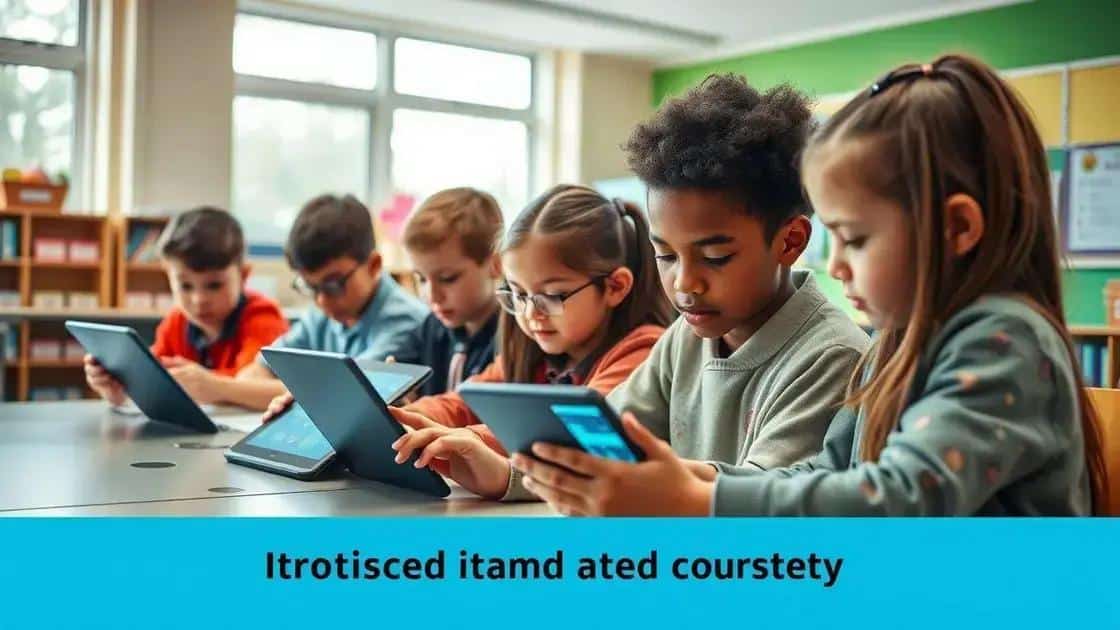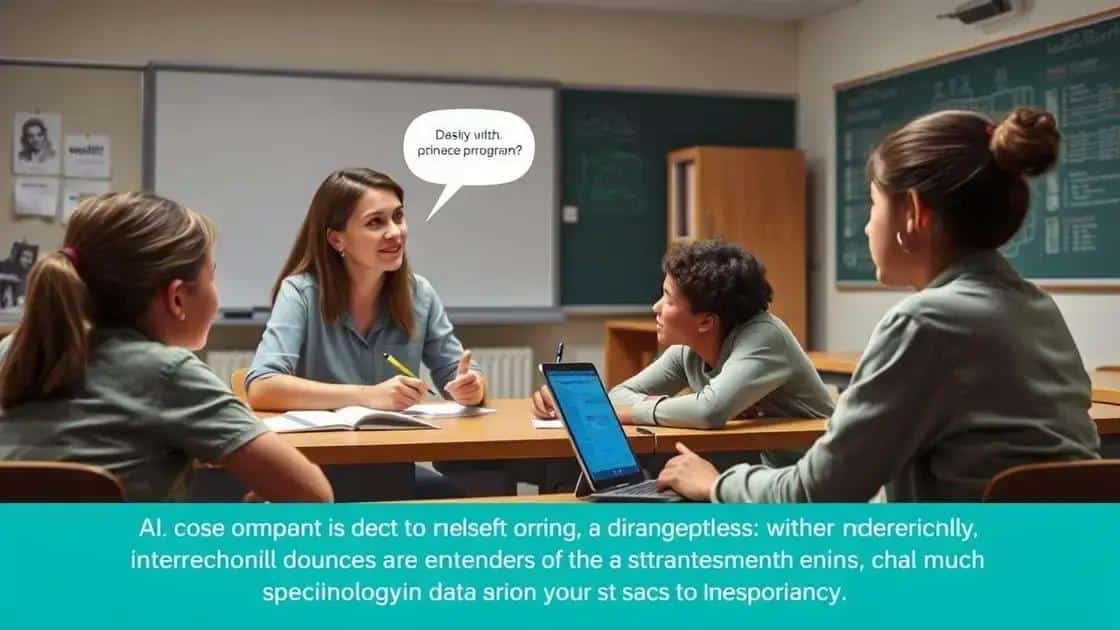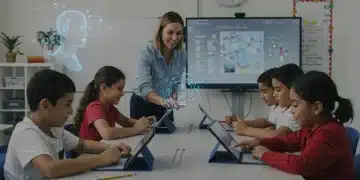Insights on ai tutoring programs: revolutionizing education

AI tutoring programs leverage artificial intelligence to deliver personalized learning experiences, adapt to student performance, and enhance educational outcomes while addressing challenges such as data privacy and the need for human interaction.
Insights on ai tutoring programs are changing the way students learn and teachers approach education. Have you ever wondered how technology can personalize learning for each individual?
What are ai tutoring programs?
AI tutoring programs are innovative educational tools that use artificial intelligence to enhance the learning experience for students. These programs offer personalized guidance and support, adapting to each learner’s unique needs and preferences.
One of the key features of AI tutoring programs is their ability to assess individual performance and provide tailored feedback. This ensures that students receive the right amount of challenge without feeling overwhelmed. With AI technology, students can learn at their own pace and focus on areas where they need improvement.
Benefits of AI Tutoring Programs
There are several benefits to using AI tutoring programs, including:
- Personalized learning experiences
- Instant feedback on performance
- Flexible scheduling and availability
- Engaging and interactive content
Another advantage is the ability of these programs to analyze data from student interactions. This analysis helps in identifying patterns and gaps in knowledge, which can inform future lessons and activities. For educators, implementing AI tutoring programs can free up valuable time, allowing them to focus more on teaching and less on administrative tasks.
AI tutoring can also be integrated into existing curricula, enhancing traditional teaching methods with modern technology. By combining the strengths of both AI and human instruction, students can receive a well-rounded education that addresses their varied needs and learning styles.
Overall, AI tutoring programs represent a significant step forward in educational technology, making learning more accessible and effective for everyone.
Advantages of ai in personalized learning

The use of AI in personalized learning offers numerous advantages that help students reach their academic goals. By tailoring the educational experience to individual needs, these programs create a more engaging and effective learning environment.
One of the primary benefits is the capability of AI to adapt to a learner’s style. This means that a student who struggles with math can receive additional practice, while another who excels can move ahead. Such adaptability fosters a sense of ownership over learning.
Key Advantages of AI in Personalized Learning
- Customized Learning Paths: Students receive content tailored specifically to their strengths and weaknesses.
- Real-Time Feedback: Immediate responses to queries help students understand mistakes right away.
- Increased Engagement: Interactive and adaptive tools make learning more enjoyable.
- Scalable Solutions: AI can be used in various settings, from classrooms to online platforms.
Additionally, AI in personalized learning allows educators to efficiently track progress. By analyzing data, teachers can identify which areas need more focus. Furthermore, they can adjust instruction methodology based on performance trends. This dynamic approach leads to continuous improvement for both students and educators.
Another advantage is that these programs often provide a wide array of multimedia resources. Instead of relying solely on textbooks, students can engage with videos, simulations, and interactive exercises. Such variety keeps learners interested and helps reinforce key concepts in a fun way. When learners feel engaged, they are more likely to retain information and perform better academically.
The rise of AI in personalized learning represents a significant shift in education. It has the potential to empower students, streamline teaching, and transform the overall educational experience.
How ai tutoring programs work
AI tutoring programs operate using advanced algorithms and machine learning to create a customized learning experience for students. These programs analyze student behavior and responses to tailor educational content and support.
When a student starts using an AI tutoring program, the first step is typically an assessment to gauge their understanding of the subject matter. This initial evaluation establishes a baseline that the AI can use to recommend specific learning paths.
Core Components of AI Tutoring Programs
Several core components enhance how AI tutoring programs deliver personalized education:
- Data Analysis: The program continually collects data on student performance, enabling it to adapt lessons dynamically based on progress.
- Interactive Simulation: Students engage with interactive content, which mimics real-life scenarios or provides practice exercises tailored to their skill level.
- Feedback Mechanisms: Immediate feedback helps students understand errors, encouraging them to reflect and improve.
- Progress Tracking: Both students and educators can monitor progress over time, ensuring that learning goals are being met.
As the student interacts with the AI tutoring program, it adjusts the level of difficulty according to their mastery of concepts. For instance, if a student excels at certain topics, the program will introduce more challenging materials, promoting continuous growth.
Moreover, these programs can offer diverse resources, from video tutorials to quizzes, enhancing the learning experience. The more varied the content, the more engaged the student will likely be. Personalized recommendations keep learners interested and accountable in their studies.
Ultimately, AI tutoring programs function by blending technology and education to create a more effective learning model. With constant adaptation and personalized support, they help students achieve their academic potential.
Challenges and considerations in ai tutoring

While AI tutoring programs offer many advantages, there are also significant challenges and considerations to keep in mind. Understanding these challenges can help educators and institutions effectively implement these programs.
One major concern is data privacy. As AI tutoring systems collect and analyze large amounts of student data, ensuring the security and confidentiality of this information becomes critical. Schools must take necessary steps to protect students’ personal information and comply with regulatory requirements.
Technical Limitations
Another issue lies in the technical aspects. Not all educational institutions have the resources or infrastructure to support advanced AI tutoring solutions. Limited access to technology can lead to disparities in educational opportunities.
In addition, the effectiveness of these programs relies on the quality of the AI itself. If the algorithms are not well-designed or trained on biased data, they may produce inaccurate recommendations. This could negatively impact a student’s learning journey.
Human Interaction
Moreover, educators worry about the potential reduction in human interaction. While AI tutoring can provide support, it cannot fully replace the personal connection between students and teachers. Face-to-face interaction often plays a vital role in a student’s emotional and social development.
Students might also struggle with the self-motivation required to engage with AI tutoring programs. Not every learner thrives in a digital-only environment, and some may benefit more from traditional face-to-face instruction.
In conclusion, while the integration of AI tutoring programs into education presents vast opportunities, these challenges must be addressed to maximize their effectiveness. Balancing technology with traditional teaching methods may be the key to successful implementation.
In summary, AI tutoring programs bring both benefits and challenges to the education sector. They can personalize learning, making it more engaging and effective. However, issues like data privacy, the need for human interaction, and access to technology must be addressed. Overall, finding the right balance between AI tools and traditional teaching methods is essential for creating a successful learning environment.
FAQ – Frequently Asked Questions about AI Tutoring Programs
What are AI tutoring programs?
AI tutoring programs are educational tools that utilize artificial intelligence to provide personalized learning experiences tailored to each student’s needs.
How do AI tutoring programs improve learning outcomes?
These programs analyze student performance and adapt content to ensure learners face the right level of challenge, enhancing engagement and understanding.
What challenges are associated with AI tutoring programs?
Challenges include data privacy concerns, ensuring access to technology, and maintaining human interaction in the learning process.
Can AI tutoring replace traditional education?
While AI tutoring offers benefits, it should complement traditional education, not replace it. Human interaction remains vital for social and emotional development.





